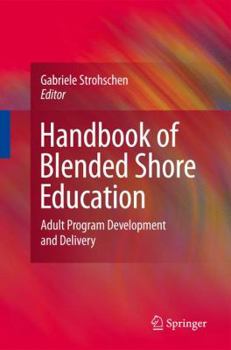Handbook of Blended Shore Education: Adult Program Development and Delivery
Select Format
Select Condition 
Book Overview
As we confront the future of our professional endeavors, we tend to rely with con'dence on longstanding and widely honored assumptions about the world and ourselves. We believe we have accumulated sturdy structures of knowledge, eff- tive practices, and sound values. Yet, we rely on these resources with scant c- sciousness that in the long run our assumptions, practices, and values may not only be inimical to the viability of our profession, but as well, oppressive in their effects on others. There is at least one assumption - common across many professions and cultures - that is of particular signi'cance. It is the assumption that the world is made up of discrete entities or units. There are not only the species of plants and animals, for example, but there is me as opposed to you, us vs. them, my business enterprise in competition with yours, our nation or religion and yours. And with this assumption of separable units, we assemble ways of sustaining and protecting those units of which we feel a part. We erect buildings, laws, schools, governments, and armies to ensure that what is inside the boundary will ?ourish, and what is outside cannot threaten us. In effect, the assumption of a world of independent entities establishes the way in which we understand and conduct ourselves within relationships.
Format:Paperback
Language:English
ISBN:1441934804
ISBN13:9781441934802
Release Date:October 2010
Publisher:Springer
Length:346 Pages
Weight:1.17 lbs.
Dimensions:0.8" x 6.1" x 9.2"
Customer Reviews
0 rating





